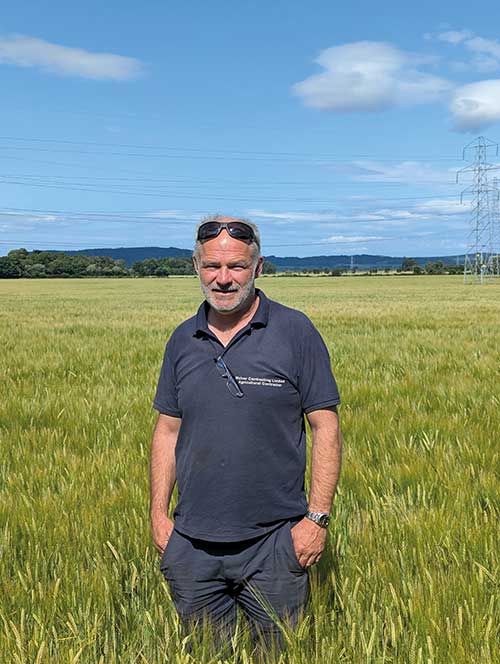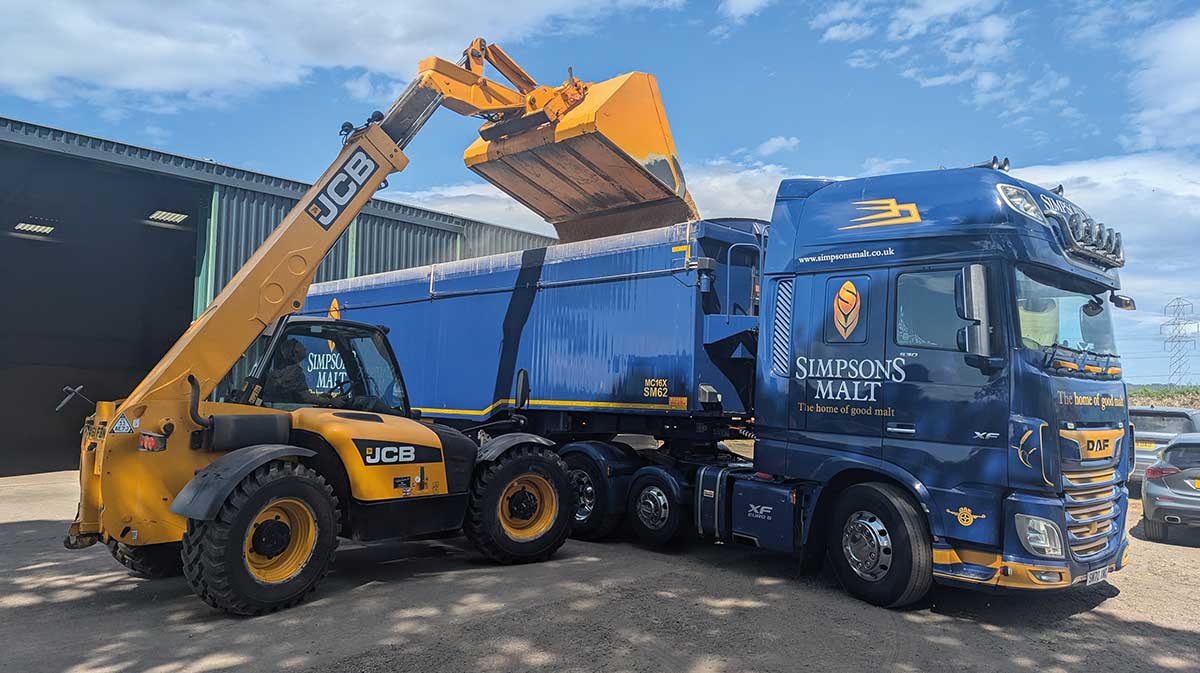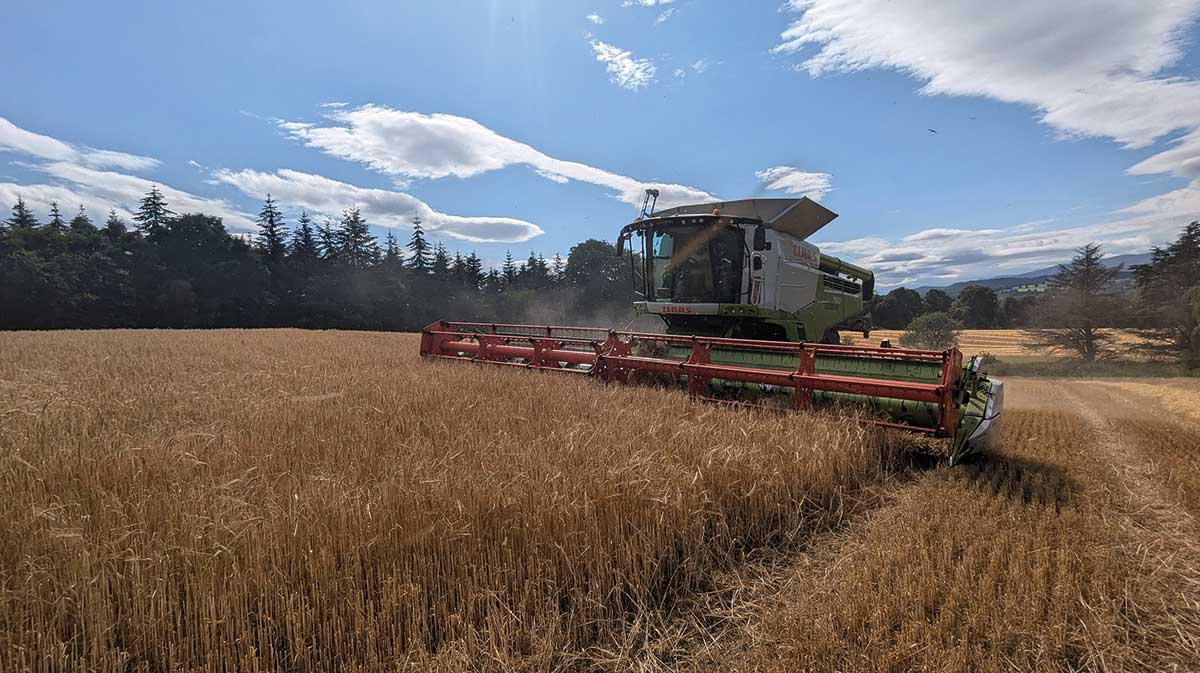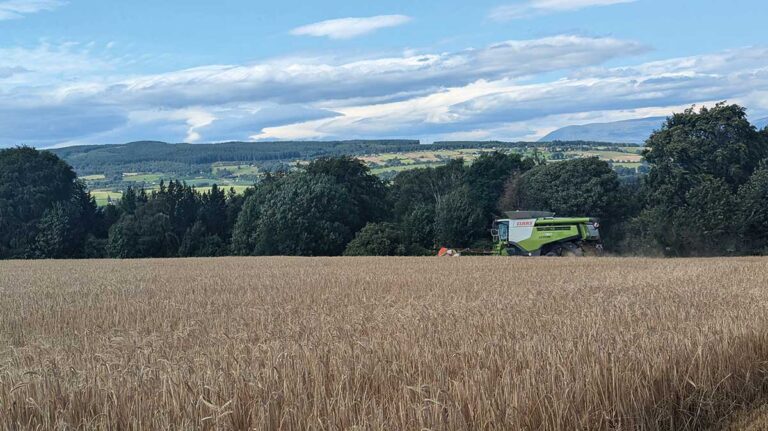When we catch up with Neil McIver at one of his company’s two bases, this one just outside of Kirkhill and the other closer to Dingwall, he is in the middle of the winter barley harvest.
“We added the crop to the rotation so we could get an early start on the combining and clear the ground in time for oilseed rape,” he explains.
“It works well with the rest of our cropping, which consists of spring barley for malting and winter wheat.”
McIver Contracting has been working around Dingwall and the Black Isle for 28 years.
He grew up with agriculture, as his father worked as a farm manager, and after completing college and gaining experience on local farms, he set up the contracting business with his brother, Calum. Neil smiles when he remembers: “All we wanted to do was drive tractors for a living.”

While his brother would go on to transition to managing their own farm with their partner, Neil continued to work as a contractor.
He says the initial business was built around standard operations, with ploughing, sowing and spraying offered using good-quality second-hand kit.
“One of the things that really helped me to stand out in those early years was when I got a contract to spray Christmas trees,” Neil explains.
“I picked up a JCB Fastrac with a demount sprayer and worked with an engineer to heighten the carriage so the boom would be over the trees. It gave me an edge because very few could offer the same service.”
Looking to contract
The shift to contract farming agreements was gradual and was a consequence of changes within the industry.
“I didn’t go out and look for these agreements at first, although I was, and still am, always on the lookout for new opportunities,” he says. “One of my customers was planning to retire and had no one to pass the farm on to, so he offered it to me under a rental agreement.”
He notes that it was a similar story for many of the agreements, with ground either being purchased by equity companies that wanted to outsource the farming operations, or large estates looking to do the same thing.
With each rental, share farming and contract farming agreement, Neil saw the acreage increase and gained access to yard and shed space.
The business now covers more than 1,000ha, with Neil noting that this figure has stayed stable for several years.
“Occasionally, some of the ground is taken out of agriculture or sold on, but there is normally another block of land available to tender for.”
Despite the large area covered, Neil runs a stripped-back fleet of machinery. Part of the reasoning for this is that purchasing decisions are often subject to discussions due to the share farming agreements.
“When you’re dealing with businesses that aren’t involved in farming, there’s a greater focus on justifying expenditure,” he says.
“This isn’t a bad thing. I think it has become clear in recent years that it is important to have a good business case for any capital investment, whether you’re a farmer or a contractor.”
Neil runs just one self-propelled sprayer – an Agrifac Condor with a 36m boom – which he says is called the ‘busiest sprayer in Scotland’ by dealer Craig Scott.
Handling five or six passes of the cereal ground each year, as well as some contracting work, with applications of both agrichemicals and liquid fertiliser, supplied by Omex and Yara, Neil says the machine can cover up to 4,000ha a year.

“We’re really at the maximum capacity for one machine,” he notes. “However, we would need to jump up in the area covered to justify another one.”
Similarly, just one combine handles the 1,000ha of cereals grown by Neil. The narrow-body Claas Lexion 760 is up for replacement, but Neil says he is unsure whether to stick with one machine or add a second unit.
“We can’t really increase the size of the kit we’re using because of the narrow lanes and gateways we must travel through, but a second machine would mean we need more staff during harvest to keep both running.”
Tractor power is supplied by Fendt. Neil purchased his first green machine in the early 2000s from Ross Agri Services in Montrose.
Now he runs two 828 Varios, a brand-new 942 Vario and a 724 Vario. The 828s were purchased second-hand from Somerset dealer Compass Tractors, with Neil saying that he isn’t afraid to look around for a deal.
“We’re more connected now, so it’s possible to find good, low-hour kit if you’re willing to look. That’s nothing against the service that we get from our local dealers, who always look after us. In fact, Ross now runs a depot out of the Muir of Ord, which is close enough that we never need to worry about maintenance.”

He continues: “I like the Fendt tractors because they come with a high specification for the money and we seem to have far fewer breakdowns than we’ve had with other brands in the past. The high speed is also a benefit, as it’s about an hour from the most northerly point of our ground to the south, so anything that cuts the time spent on the road is a huge benefit.”
The fleet is rounded out with various bits of cultivation and sowing equipment. A 4m Väderstad Spirit and a 6m Lemken power harrow and drill combination handle the bulk of the establishment, both fitted with split hoppers for seed and fertiliser.
Oilseed rape is put down with a 4m Väderstad TopDown and BioDrill combination. While a lot of the ground is prepared with minimum tillage, there is still plenty of ploughing done within the rotation, handled by two Lemken six-furrow machines suitable for on-land and in-furrow operation, and a five-furrow Kverneland plough.
Putting people in the seat
Alongside Neil, there are two full-time members of staff, one of whom previously worked as an agronomist. This means a lot of the cropping decisions are made with their advice.
A self-employed operator is also brought in to help, with up to three casual workers on duty throughout harvest.
While most of the tasks are handled in-house, Neil also works with a local contractor to apply lime, which is spread as required using a variable-rate system.
Considered investment has been made in precision farming equipment within McIver Contracting. All tractors are fitted with RTK guidance, as is the sprayer,
and the combine runs on an Egnos correction signal.
The Amazone fertiliser spreader has variable-rate application unlocked, used to top up potash and phosphate levels throughout the season.
“We also looked at variable-rate seeding, but we don’t really have an issue with differing soil types. Pretty much everywhere we farm is on sandy loam soils, so we would need to see some substantial cost savings before we invested in that system.”
To keep staff busy through the winter, Neil has invested in a 13t tracked excavator, which will be used to maintain and install drainage systems across the different farms, alongside a 2.5t machine.
“It’s another way to keep our outgoings down while maintaining the productivity of our ground and creating work during the quietest periods.”
Concluding, he says he is on the lookout for more ground. He believes he is equipped to handle another 200ha.
“We’re in a good position because we have that spare capacity. If the ground is in good condition and close by, we can definitely incorporate it into the business.”


